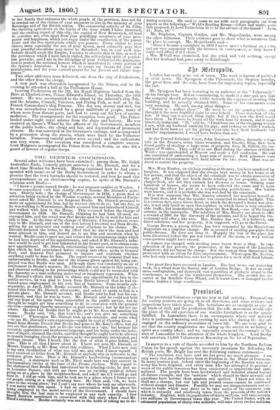ght 311rtrupolio.
London has really gone out of town. The week is barren of political or civic news. Mr. Spurgeon at the Tabernacle, the Stepney murder, the great fires, and the rain, have been the engrossing topics, especially the last.
Mr. Spurgeon has been lecturing to an audience at the " Tabernacle " on his foreign tour. Before commencing, he made it a sine qua non that the company should subscribe 1000/. towards the expense of erecting this building, and he actually obtained 960/. Some of his statements were very amusing. He said, among other things— "Baden is a godless place." He went to see the gamine'-table, and thought it the most frightful sight he ever beheld. Those were best off who lost. If they lost it served them right, but if they won the devil would have them. In Prussia he found all the work done by women, and it made him truly indignant. "If," said he "I had been one of the strapping women I saw, with my husband smoking his pipe, and looking on while I worked, and had there been an act for giving wives who beat their husbands two months' imprisonment, I would have broken that act."
At the Central Criminal Court, John Constant Woillez, formerly a Cap- tain in the Zouaves, seven times wounded, and Charles Bliss, have been found guilty of stealing a large mass of property from M. Gillett, the em- ployer of Woillez. They sold it to one Hart during the absence of Gillett. Woillez was apprehended at Moscow and made a full confession. He was also convicted of embezzling a large sum of money. Both prisoners were sentenced to imprisonment with hard labour for two years. Hart was or- dered to restore the property.
Mrs. Mary Emsley, an old lady residing at Stepney, has been murdered by burglars. It was supposed that she always kept money in her house or on her person, and that the object of the criminals was to obtain possession of the gold. They did not touch deeds relating to her property, nor her cheque-book, nor did they ransack her drawers or boxes. Owning some hundreds of houses' she seems to have collected the rents and to have changed the silver for gold at a neighbouring publichouse. Her habits were known, and it is probable she was watched by the criminals.
It is now supposed that Mrs. Emsley admitted her murderer herself at the front door, and that the murder was committed in broad daylight. This is a curious fact, since Grove Road, in which the deceased's house was situ- ate, is not only itself an open thoroughfare in which there is very consider- able traffic, but immediately abuts upon the Bow Road,—one of the largest arteries in the metropolis. The relatives of Mrs. Emsley are about to offer a reward of 2001. for the discovery of the assassin, and it is hoped the Go- vernment will offer a like sum. Mrs. Emsley has not, it is believed, any direct relations, and her property, it is supposed, will go to the Crown.
George Brown, a young fellow, has been remanded by the Marylebone Magistrate on a singular charge. He is accused of stealing gas-pipes from public-houses. He does not deny it. Happily the loss of the pipes has been discovered before the gas was turned on at the main, or very serious consequences might have ensued.
A woman was charged with stealing some bacon from a shop. In con- sideration of her poverty the prosecutor, at the request of the Lambeth Magistrate, did not !press the charge. But the woman then threatened the prosecutor with an action for false imprisonment. Whereupon Mr. Norton, who had only remanded her, sent her to prison for a week with hard labour.
Two great fires have occurred in London. The first broke out yesterday week, in a wharf near the Surrey side of London Bridge. It was an enor- mous conflagration and destroyed vast quantities of products stored in the warehouses, as well as the warehouses themselves. The second fire oc- curred at the Ratcliffe Cross Wharf, and it burnt down or damaged twelve houses, besides a large warehouse.


























 Previous page
Previous page